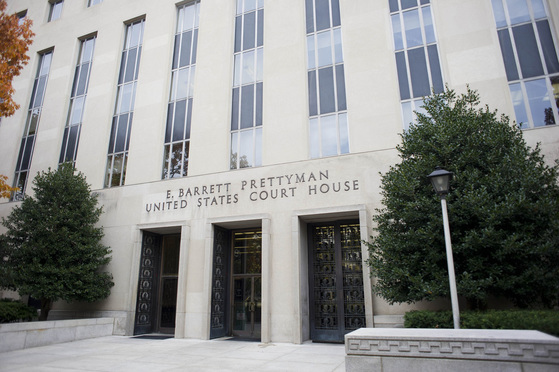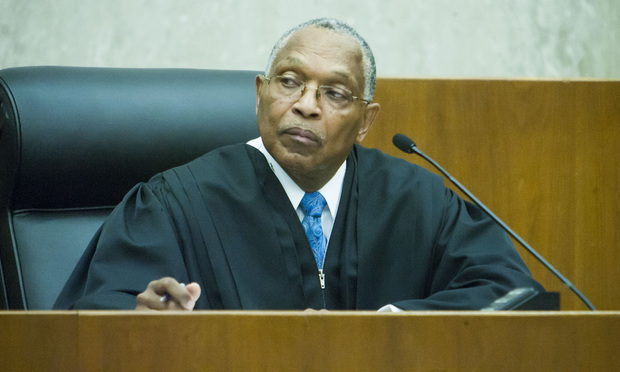'There's an Opportunity Here:' At FISA Court, New Judge Takes Charge as Justice Dept. Comes Under Scrutiny
U.S. District Judge James Boasberg's appointment as presiding judge of the Foreign Intelligence Surveillance Court in Washington comes as the U.S. Justice Department faces new scrutiny over Russia-related surveillance measures.
January 10, 2020 at 12:09 PM
9 minute read
 U.S. District Judge James Boasberg of the U.S. District Court for the District of Columbia. (Photo: Diego M. Radzinschi/ ALM)
U.S. District Judge James Boasberg of the U.S. District Court for the District of Columbia. (Photo: Diego M. Radzinschi/ ALM)
In 2017, the 11 judges serving on the secretive U.S. surveillance court convened for a rare occasion.
Drawn from federal trial courts across the country, the judges of the Foreign Intelligence Surveillance Court were accustomed to working alone in weeklong shifts reviewing U.S. applications for wiretaps. But an appeal demanding wider public access to the surveillance court's opinions brought them together as a full court, providing what U.S. District Judge Rosemary Collyer celebrated as a "rare and wonderful opportunity to wrestle together over some weighty legal principles and issues."
In a 6-5 opinion, the divided surveillance court said the American Civil Liberties Union and Yale Law School had legal standing to press for greater disclosure of opinions. Writing for the majority was a Washington federal trial judge who, at the time, was less than halfway into his seven-year term on the surveillance court: James Boasberg.
"By necessity, this court conducts much of its work in secrecy," Boasberg wrote in the ruling. "But it does so within a judicial system wedded to transparency and deeply rooted in the ideal that 'justice must satisfy the appearance of justice."
More than two years later, he has once again taken a leading role on the surveillance court. On Jan. 1, Boasberg became the court's presiding judge, succeeding Collyer, who stepped down nine weeks earlier than planned for health reasons.
Boasberg's leadership comes at a time of substantial renewed scrutiny of government surveillance practices and oversight systems following a report last month, from the U.S. Justice Department's inspector general, that faulted the FBI for failing to adhere to its standards of "accuracy and completeness" in obtaining the court's approval to secretly monitor a former adviser to Donald Trump's presidential campaign.
Collyer in one of her last moves as presiding judge ordered the Justice Department to tell the court about what the FBI has done and will do to ensure future surveillance applications "accurately and completely" reflect information the government has learned. That filing is due today.
The inspector general's report reignited calls from civil liberties advocates and others for reforms about how the FBI obtains surveillance warrants. For years, privacy and civil liberties advocates have decried the system as lacking adequate oversight and transparency. Those questions, and concerns, now come before Boasberg.
"A moment here for Boasberg to seize."
A Yale graduate who shared a house in law school with now-Justice Brett Kavanaugh, Boasberg, 56, was appointed to the U.S. District Court for the District of Columbia by President Barack Obama in 2011. Boasberg, a former federal prosecutor and law firm associate, was previously appointed by President George W. Bush to the D.C. Superior Court.
Known as "Jeb," Boasberg is widely recognized in Washington legal circles for a conversational and oftentimes humorous writing style. He joined the surveillance court in 2014.
The chief justice of the Supreme Court designates the presiding judge of the surveillance court, and up until now John Roberts had selected Republican-appointed trial judges to lead the court. Boasberg's selection made him the first appointee of a Democratic president to sit atop the surveillance court since 2002, when U.S. District Judge Colleen Kollar-Kotelly led the court.
Established in 1978, the court operates from the E. Barrett Prettyman U.S. Courthouse in downtown Washington. Much of the court's work is done in secret, with the government unilaterally seeking surveillance orders outside the presence of any defense lawyer.
 E. Barrett Prettyman U.S. Courthouse, Washington, D.C. (Photo: Diego M. Radzinschi/ALM)
E. Barrett Prettyman U.S. Courthouse, Washington, D.C. (Photo: Diego M. Radzinschi/ALM)In interviews, lawyers and judges familiar with the FISA process said the presiding judge role puts Boasberg in a position to confront and rule on transparency and accountability matters that could arise from the Justice Department's acknowledged missteps early in the Russia investigation.
"There's an opportunity here for the presiding judge of the FISA court to hold the government's feet to the fire by requiring far greater candor and disclosure of potentially exculpatory information, even as the FISA system itself requires more fundamental reforms," said Ashley Gorski, a staff attorney with the ACLU's National Security Project. "There's a moment here for Boasberg to seize, and I hope he seizes it," she added.
In recent years, the surveillance court took steps to shed some light on its practices, releasing certain orders and opinions and setting up a public website that features various pending matters. The court in 2015 began appointing amicus counsel in certain cases to represent privacy interests that might not otherwise be reflected in the government's push for an order letting investigators eavesdrop on a target.
Civil liberties advocates are hopeful Boasberg will take steps to at least partially unseal more of the court's opinions, a move that would require coordination with the U.S. Justice Department, which reviews opinions and other documents before they can be declassified. And he could nudge the court to more regularly appoint amicus counsel to argue against the Justice Department on issues raised by surveillance applications.
The court could also decide to appoint an amicus to review and respond to the FBI's proposed reforms. The court has an approved amicus list whose members include Arnold & Porter partner Amy Jeffress; Georgetown Law professor Laura Donohue; Jonathan Cedarbaum, a partner at Wilmer Cutler Pickering Hale and Dorr; David Kris, a former Obama-era head of the Justice Department's national security division; and Marc Zwillinger, founder and managing partner of the Washington-based law firm ZwillGen.
Boasberg's writing on the surveillance court gives some insight into his thinking about national security and privacy. In an October 2018 decision, declassified late last year, Boasberg ruled that the FBI's procedures for searching vast databases containing Americans' private communications violated Fourth Amendment privacy rights.
Boasberg's ruling came just months after Congress extended Section 702 of FISA, which allows for the warrantless collection of communications including emails and phone records of non-U.S. citizens outside the country. The collection program sweeps up communications of Americans, amassing vast databases that the government can search without prior court authorization.
In extending Section 702 by six years, Congress required the agencies using the repository to receive court approval for rules addressing how they search it for Americans' data. Boasberg, in the October 2018 decision, approved the CIA's and National Security Agency's procedures but rejected the FBI's, ruling that they were "not consistent with the requirements of the Fourth Amendment." Boasberg objected to the FBI's proposal to document all queries of the Section 702 databases without distinguishing between searches focused on Americans and those targeting foreigners.
The FBI appealed the ruling to a three-judge panel that reviews the surveillance court's decisions. The Foreign Intelligence Surveillance Court of Review upheld Boasberg's ruling, and the FBI changed its procedures.
As presiding judge, Boasberg is expected to also be the face of the court, acting as its liaison with the executive and legislative branches.
 Judge Reggie Walton of the U.S. District Court for the District of Columbia. June 6, 2016. (Photo: Diego M. Radzinschi/ALM)
Judge Reggie Walton of the U.S. District Court for the District of Columbia. June 6, 2016. (Photo: Diego M. Radzinschi/ALM)U.S. District Judge Reggie Walton, who served as the surveillance court's presiding judge from 2013 to May 2014, said the role resembles the position of chief judge in a federal trial court with its administrative duties and responsibility to take on at times complex and time-consuming matters. Like the other 10 judges on the surveillance court, the presiding judge spends a week on duty every 11 weeks hearing national security wiretap applications.
During his yearlong service as presiding judge, Walton confronted the fallout from the leaks of National Security Agency files by the former intelligence contractor Edward Snowden. The court faced considerable criticism that judges were rubber-stamping surveillance applications without thought.
In a July 2013 letter to the Senate, Walton said the surveillance court requests additional information or changes the proposed terms of government surveillance in a "significant percent of cases," noting that the court had also "recently initiated the process of tracing more precisely how frequently this occurs." Walton would later tell the Senate that, between July and September 2013, "substantive changes" were made to about a quarter of surveillance applications submitted to the court.
In 2018, the FISA court said it had received 1,318 surveillance applications from federal agencies. Nearly 75 percent of those—985—were granted, according to the latest annual report from the court. The court said 261 orders were modified, 42 orders were denied in part, and 30 applications were denied in full.
Walton, in an interview with National Law Journal, said the revelations from the Justice Department inspector general's report were "obviously troubling." But based on the report's findings, he said, "I don't see where there have to be significant changes in how the [FISA] court operates."
"I think there's this myth out there that the court just approves everything that's brought to the court, and that's just not true," Walton said, adding that the court "does not just rubber-stamp" surveillance applications.
Walton, describing Boasberg as "very thoughtful" and "extremely bright," said he has the experience and acumen to lead the court through any tumultuous stretch.
"I'm sure he will be objective in his approach to applications brought to the court," Walton said.
"So I feel very confident that he will do an excellent job."
Read more:
DOJ's Watchdog on Barr: 'He's Free to Have His Opinion. We Have Our Finding'
Former Justice Dept. Leaders Slam Barr's Commentary on Inspector General's Report
Hundreds of Law Profs Declare Trump's Conduct 'Clearly Impeachable'
'Serious Performance Failures,' But No Anti-Trump Bias: DOJ Watchdog's Report
Mueller's Restraint, Barr's Press Conference: Here's What Lawyers Are Saying
5 Things to Know About John Durham, Barr's Pick to Lead Russia Probe
This content has been archived. It is available through our partners, LexisNexis® and Bloomberg Law.
To view this content, please continue to their sites.
Not a Lexis Subscriber?
Subscribe Now
Not a Bloomberg Law Subscriber?
Subscribe Now
NOT FOR REPRINT
© 2025 ALM Global, LLC, All Rights Reserved. Request academic re-use from www.copyright.com. All other uses, submit a request to [email protected]. For more information visit Asset & Logo Licensing.
You Might Like
View All

'A Warning Shot to Board Rooms': DOJ Decision to Fight $14B Tech Merger May Be Bad Omen for Industry

'Incredibly Complicated'? Antitrust Litigators Identify Pros and Cons of Proposed One Agency Act
5 minute readLaw Firms Mentioned
Trending Stories
- 1Uber Files RICO Suit Against Plaintiff-Side Firms Alleging Fraudulent Injury Claims
- 2The Law Firm Disrupted: Scrutinizing the Elephant More Than the Mouse
- 3Inherent Diminished Value Damages Unavailable to 3rd-Party Claimants, Court Says
- 4Pa. Defense Firm Sued by Client Over Ex-Eagles Player's $43.5M Med Mal Win
- 5Losses Mount at Morris Manning, but Departing Ex-Chair Stays Bullish About His Old Firm's Future
Who Got The Work
J. Brugh Lower of Gibbons has entered an appearance for industrial equipment supplier Devco Corporation in a pending trademark infringement lawsuit. The suit, accusing the defendant of selling knock-off Graco products, was filed Dec. 18 in New Jersey District Court by Rivkin Radler on behalf of Graco Inc. and Graco Minnesota. The case, assigned to U.S. District Judge Zahid N. Quraishi, is 3:24-cv-11294, Graco Inc. et al v. Devco Corporation.
Who Got The Work
Rebecca Maller-Stein and Kent A. Yalowitz of Arnold & Porter Kaye Scholer have entered their appearances for Hanaco Venture Capital and its executives, Lior Prosor and David Frankel, in a pending securities lawsuit. The action, filed on Dec. 24 in New York Southern District Court by Zell, Aron & Co. on behalf of Goldeneye Advisors, accuses the defendants of negligently and fraudulently managing the plaintiff's $1 million investment. The case, assigned to U.S. District Judge Vernon S. Broderick, is 1:24-cv-09918, Goldeneye Advisors, LLC v. Hanaco Venture Capital, Ltd. et al.
Who Got The Work
Attorneys from A&O Shearman has stepped in as defense counsel for Toronto-Dominion Bank and other defendants in a pending securities class action. The suit, filed Dec. 11 in New York Southern District Court by Bleichmar Fonti & Auld, accuses the defendants of concealing the bank's 'pervasive' deficiencies in regards to its compliance with the Bank Secrecy Act and the quality of its anti-money laundering controls. The case, assigned to U.S. District Judge Arun Subramanian, is 1:24-cv-09445, Gonzalez v. The Toronto-Dominion Bank et al.
Who Got The Work
Crown Castle International, a Pennsylvania company providing shared communications infrastructure, has turned to Luke D. Wolf of Gordon Rees Scully Mansukhani to fend off a pending breach-of-contract lawsuit. The court action, filed Nov. 25 in Michigan Eastern District Court by Hooper Hathaway PC on behalf of The Town Residences LLC, accuses Crown Castle of failing to transfer approximately $30,000 in utility payments from T-Mobile in breach of a roof-top lease and assignment agreement. The case, assigned to U.S. District Judge Susan K. Declercq, is 2:24-cv-13131, The Town Residences LLC v. T-Mobile US, Inc. et al.
Who Got The Work
Wilfred P. Coronato and Daniel M. Schwartz of McCarter & English have stepped in as defense counsel to Electrolux Home Products Inc. in a pending product liability lawsuit. The court action, filed Nov. 26 in New York Eastern District Court by Poulos Lopiccolo PC and Nagel Rice LLP on behalf of David Stern, alleges that the defendant's refrigerators’ drawers and shelving repeatedly break and fall apart within months after purchase. The case, assigned to U.S. District Judge Joan M. Azrack, is 2:24-cv-08204, Stern v. Electrolux Home Products, Inc.
Featured Firms
Law Offices of Gary Martin Hays & Associates, P.C.
(470) 294-1674
Law Offices of Mark E. Salomone
(857) 444-6468
Smith & Hassler
(713) 739-1250









